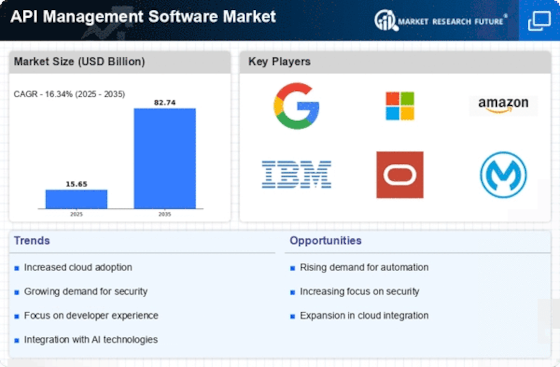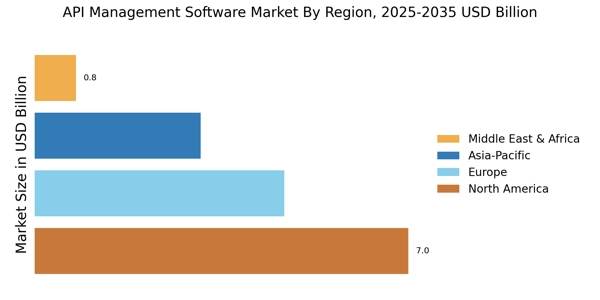Need for Enhanced Customer Experience
The API Management Software Market is increasingly driven by the need for enhanced customer experience. Organizations are recognizing that APIs are essential for delivering personalized and responsive services to their customers. By leveraging API management solutions, businesses can integrate various data sources and provide a unified experience across multiple channels. Market Research Future indicates that companies focusing on customer experience can achieve up to a 20% increase in customer satisfaction scores. As customer expectations continue to evolve, the API Management Software Market is likely to see continued investment as organizations strive to meet and exceed these expectations.
Expansion of Mobile and IoT Applications
The proliferation of mobile applications and Internet of Things (IoT) devices is driving the API Management Software Market to new heights. As more devices become interconnected, the need for efficient API management solutions becomes paramount. The market is projected to expand as organizations seek to leverage APIs to facilitate communication between mobile apps and IoT devices. Recent estimates indicate that the number of connected IoT devices could reach over 30 billion by 2030, creating a substantial demand for API management solutions that can handle increased traffic and ensure seamless integration. This trend underscores the critical role of the API Management Software Market in supporting the growing ecosystem of mobile and IoT applications.
Rising Demand for Digital Transformation
The API Management Software Market is experiencing a notable surge in demand driven by the ongoing digital transformation across various sectors. Organizations are increasingly adopting digital solutions to enhance operational efficiency and customer engagement. According to recent data, the market for API management software is projected to grow at a compound annual growth rate of approximately 30% over the next five years. This growth is largely attributed to the need for seamless integration of applications and services, enabling businesses to respond swiftly to market changes. As companies strive to innovate and improve their digital offerings, the API Management Software Market is positioned to play a crucial role in facilitating these transformations.
Growing Emphasis on Data Privacy and Compliance
In the current landscape, the API Management Software Market is significantly influenced by the growing emphasis on data privacy and regulatory compliance. With the introduction of stringent regulations such as GDPR and CCPA, organizations are compelled to ensure that their APIs adhere to these legal frameworks. This has led to an increased demand for API management solutions that offer robust security features and compliance capabilities. Market analysis suggests that companies investing in API management software can reduce the risk of data breaches and enhance their reputation among consumers. As a result, the API Management Software Market is likely to see sustained growth as businesses prioritize compliance and data protection.
Increased Adoption of Microservices Architecture
The API Management Software Market is witnessing a significant shift towards microservices architecture, which is reshaping how applications are developed and deployed. This architectural style allows organizations to build applications as a suite of small, independent services that communicate through APIs. The adoption of microservices is expected to enhance scalability and flexibility, making it easier for businesses to adapt to changing demands. Recent studies indicate that companies utilizing microservices report a 20 to 30% improvement in deployment frequency and a reduction in failure rates. Consequently, the API Management Software Market is becoming increasingly vital as organizations seek to manage these complex ecosystems effectively.

















